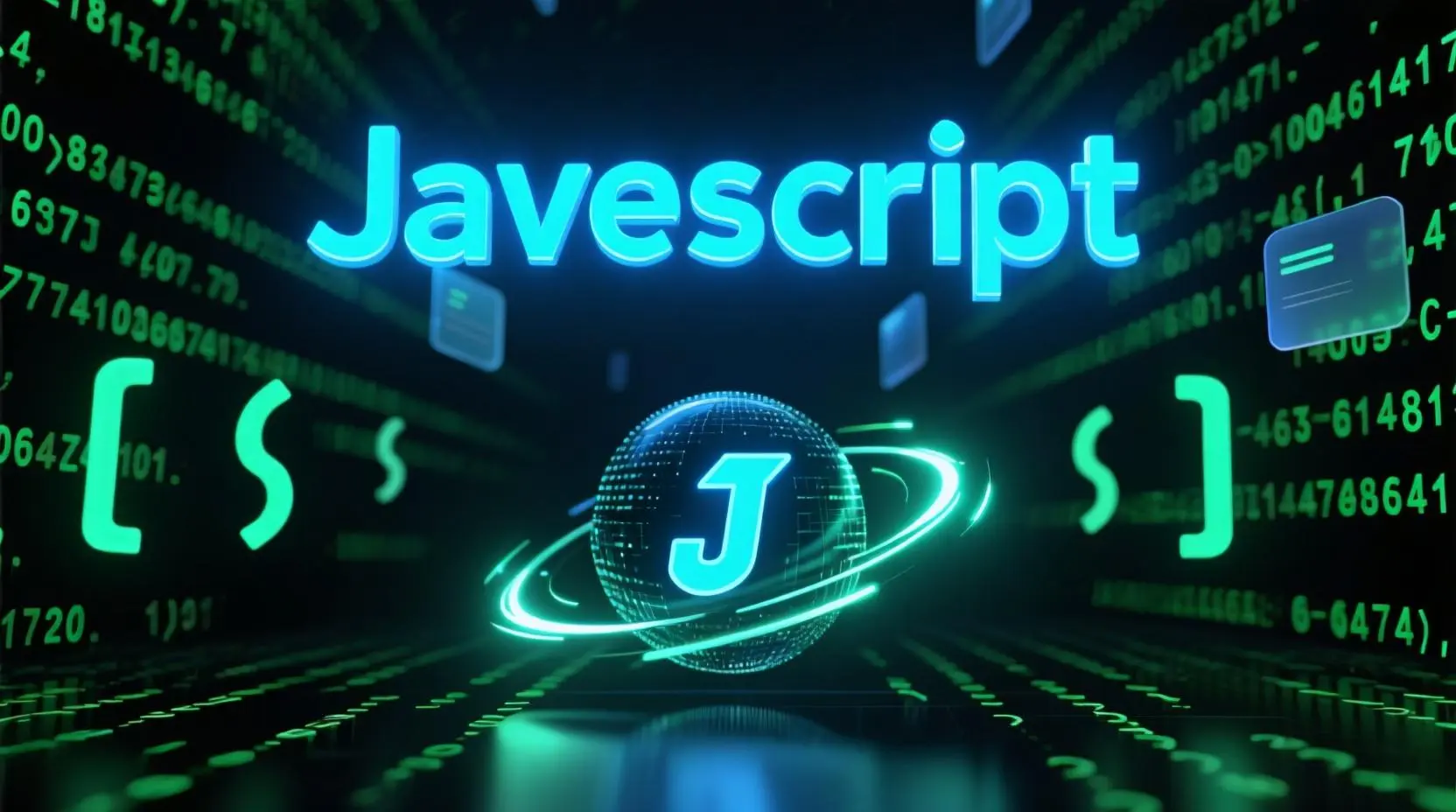JavaScript is one of the most popular programming languages in the world. It is the backbone of modern web development, enabling developers to create dynamic and interactive websites. Whether you are a beginner just starting or an experienced developer looking to enhance your skills, understanding JavaScript is crucial for building robust web applications. This article provides a comprehensive guide to JavaScript, covering its basics, features, practical uses, and advanced concepts.
What is JavaScript?
JavaScript is a high level, interpreted programming language primarily used for web development. Unlike HTML and CSS, which are used for structure and styling, JavaScript brings life to websites by enabling interactivity. From simple tasks like validating forms to complex operations like building web applications, JavaScript is essential for modern websites.
Key Features of JavaScript
- Dynamic Typing: JavaScript does not require variable types to be declared explicitly, making it flexible and easier for beginners.
- Interpreted Language: It runs directly in the browser without the need for compilation.
- Event Driven Programming: JavaScript can respond to user actions like clicks, mouse movements, and keyboard inputs.
- Versatility: JavaScript can be used on both client-side (frontend) and server side (backend) development through Node.js.
Why Learn JavaScript?
Learning JavaScript opens up numerous opportunities in web development. Here are some reasons why JavaScript is worth learning:
- High Demand in Job Market: Almost every web development job requires knowledge of JavaScript.
- Full-Stack Development: JavaScript allows developers to work on both frontend and backend using technologies like Node.js.
- Extensive Community Support: With millions of developers worldwide, finding tutorials, forums, and libraries is easy.
- Rich Ecosystem: Popular frameworks like React, Angular, and Vue.js enhance JavaScript’s capabilities.
JavaScript Basics
Before diving into complex projects, it’s important to understand the core concepts of JavaScript.
Variables and Data Types
Variables are used to store data in JavaScript. You can declare variables using var, let, or const.
let name = "John";
const age = 25;
var isStudent = true;
Common data types in JavaScript include:
- String: Text, e.g.,
"Hello World" - Number: Numeric values, e.g.,
100,3.14 - Boolean: True or false, e.g.,
true - Array: A list of values, e.g.,
[1, 2, 3] - Object: A collection of key-value pairs, e.g.,
{name: "Alice", age: 30}
Functions
Functions are reusable blocks of code that perform specific tasks.
function greet(name) {
return `Hello, ${name}!`;
}
console.log(greet("Alice")); // Output: Hello, Alice!
Conditional Statements
Conditional statements control the flow of a program based on conditions.
let score = 85;
if (score >= 90) {
console.log("Excellent");
} else if (score >= 70) {
console.log("Good");
} else {
console.log("Needs Improvement");
}
Loops
Loops are used to repeat code multiple times.
for (let i = 0; i < 5; i++) {
console.log(i);
}
Events
JavaScript interacts with the user through events like clicks, inputs, and mouse movements.
document.getElementById("myButton").addEventListener("click", function() {
alert("Button clicked!");
});
Advanced JavaScript Concepts
Once you master the basics, you can explore advanced topics to become a proficient JavaScript developer.
DOM Manipulation
The Document Object Model (DOM) represents the HTML structure of a webpage. JavaScript can manipulate the DOM to change content dynamically.
document.getElementById("title").innerText = "Welcome to JavaScript!";
Asynchronous Programming
JavaScript supports asynchronous operations through callbacks, promises, and async/await, which are essential for tasks like fetching data from APIs.
fetch("https://api.example.com/data")
.then(response => response.json())
.then(data => console.log(data))
.catch(error => console.error(error));
JavaScript Frameworks and Libraries
JavaScript frameworks and libraries simplify development:
- React.js: A library for building user interfaces.
- Angular: A framework for creating large scale web applications.
- Vue.js: A progressive framework for building interactive interfaces.
- Node.js: JavaScript runtime for server side development.
Practical Applications of JavaScript
JavaScript is not just for web pages; its applications are vast and varied.
- Web Development: Enhances user experience through interactive forms, sliders, and dynamic content.
- Game Development: Libraries like Phaser.js enable developers to create browser-based games.
- Mobile App Development: Frameworks like React Native allow building mobile apps using JavaScript.
- Server-Side Development: Node.js makes it possible to run JavaScript on servers.
- AI and Machine Learning: Libraries such as TensorFlow.js enable machine learning in JavaScript.
Best Practices in JavaScript
To write efficient and maintainable code, follow these best practices:
- Use
letandconstInstead ofvar: Avoid variable hoisting issues. - Keep Code Modular: Divide code into reusable functions and modules.
- Use Strict Mode: Helps catch errors early by enabling
"use strict";. - Comment Your Code: Improves readability and maintainability.
- Test Your Code Regularly: Debug using browser tools or Node.js environments.
Learning Resources
Here are some recommended resources for learning JavaScript:
- MDN Web Docs: Comprehensive reference for JavaScript features.
- W3Schools: Beginner-friendly tutorials and examples.
- FreeCodeCamp: Interactive coding lessons.
- JavaScript.info: Detailed guides on JavaScript concepts.
Conclusion
JavaScript is a versatile and essential language for web developers. From building dynamic websites to creating full fledged applications, JavaScript offers endless possibilities. By mastering its basics, exploring advanced concepts, and following best practices, developers can create efficient, interactive, and SEO-friendly web experiences. Whether you are aiming for a career in front-end development, full-stack development, or even AI applications, JavaScript remains a key skill in the modern tech world.

Gaming Keyboard and Mouse and Mouse pad and Gaming Headset, Wired LED RGB Backlight Bundle
Gaming Keyboard and Mouse and Mouse pad and Gaming Headset, Wired LED RGB Backlight Bundle for PC Gamers and Xbox and PS4 Users - 4 in 1 Edition Hornet RX-250

ESR for MagSafe Wallet
ESR for MagSafe Wallet, 5-Card Holder With RFID Blocking, MagSafe Sticker Included, Slim Magnetic Wallet for iPhone 17/16/15/14/13/12 Series and Selected Samsung Devices, Not for 13/12 Mini, Black

Amazon Fire 7 Kids tablet
Amazon Fire 7 Kids tablet, ages 3-7. Top-selling 7\" kids tablet on Amazon. Includes ad-free and exclusive content, easy parental controls, 10-hr battery, 16 GB, Blue

Karaoke Machine
Karaoke Machine with 2 Wireless Rechargeable Microphones: Portable Bluetooth Speaker for Adults & Kids - PA System with Lights Supports TWS/TF Card/USB/AUX for Home Party


I don’t even know how I ended up here, but I thought this post was good. I don’t know who you are but definitely you’re going to a famous blogger if you aren’t already 😉 Cheers!
Regards for helping out, wonderful information. “You must do the things you think you cannot do.” by Eleanor Roosevelt.
I am glad to be one of the visitants on this great internet site (:, regards for posting.
Hello very nice website!! Man .. Excellent .. Amazing .. I will bookmark your site and take the feeds additionally?KI am satisfied to seek out numerous useful info right here in the put up, we need develop more techniques on this regard, thanks for sharing. . . . . .
Hey! I just wanted to ask if you ever have any problems with hackers? My last blog (wordpress) was hacked and I ended up losing many months of hard work due to no back up. Do you have any solutions to protect against hackers?
so much wonderful information on here, : D.
I like what you guys tend to be up too. This kind of clever work and exposure! Keep up the wonderful works guys I’ve you guys to our blogroll.
Wonderful site. Lots of useful information here. I am sending it to some friends ans also sharing in delicious. And obviously, thanks for your effort!
I found your blog site on google and check just a few of your early posts. Continue to maintain up the very good operate. I just further up your RSS feed to my MSN Information Reader. In search of ahead to studying extra from you later on!…
Howdy very cool blog!! Man .. Beautiful .. Superb .. I’ll bookmark your blog and take the feeds additionally?KI’m satisfied to seek out a lot of useful information right here within the put up, we want develop extra techniques in this regard, thanks for sharing. . . . . .
Hello my friend! I wish to say that this article is awesome, great written and include almost all important infos. I would like to peer more posts like this .
Great – I should definitely pronounce, impressed with your website. I had no trouble navigating through all tabs as well as related information ended up being truly easy to do to access. I recently found what I hoped for before you know it in the least. Reasonably unusual. Is likely to appreciate it for those who add forums or anything, site theme . a tones way for your client to communicate. Excellent task.
Amazing! This blog looks just like my old one! It’s on a totally different topic but it has pretty much the same layout and design. Outstanding choice of colors!
I have not checked in here for a while as I thought it was getting boring, but the last several posts are good quality so I guess I?¦ll add you back to my daily bloglist. You deserve it my friend 🙂
Great post and straight to the point. I don’t know if this is truly the best place to ask but do you guys have any ideea where to hire some professional writers? Thank you 🙂
Hello my friend! I want to say that this article is amazing, nice written and include approximately all vital infos. I would like to see more posts like this.
Dead composed written content, regards for entropy. “He who establishes his argument by noise and command shows that his reason is weak.” by Michel de Montaigne.
Rattling informative and great structure of content, now that’s user friendly (:.
Just a smiling visitor here to share the love (:, btw great design.
so much good information on here, : D.
I know this if off topic but I’m looking into starting my own weblog and was wondering what all is needed to get setup? I’m assuming having a blog like yours would cost a pretty penny? I’m not very web savvy so I’m not 100 sure. Any recommendations or advice would be greatly appreciated. Many thanks
Sugaring effektive und moderne Haarentfernung in Berlin Die Epilation mit Zuckerpaste wird von unseren speziell dafür ausgebildeten Kosmetikerinnen / Depiladoras an allen Körperregionen durchgeführt. Wir bieten diese effektive und moderne Behandlung sehr erfolgreich und schonend mit einem Maximum in der Hygiene der Anwendung an. Sugaring wird immer beliebter.
Hello my family member! I want to say that this post is awesome, nice written and come with approximately all important infos. I would like to look extra posts like this .